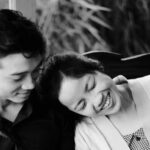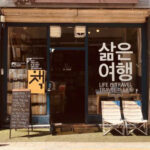
This post features five memoirs by Korean authors that dive into historical, political, and sociological dimensions of what it can mean to live in the world. Even as these memoirs converse with one another and touch upon similar and related historical and social issues, the authors’ divergent perspectives and concerns speak to the dynamism and diversity that characterize experiences of being Korean. Pick up one or more of these memoirs to discover what these spirited authors have to say about the world and their experiences in it.
Tastes Like War: A Memoir by Grace M. Cho
In her memoir Tastes Like War, Grace M. Cho explores food, survival, and her relationship with her mother. Within the memoir, she also notably tracks the development of her mother’s schizophrenia, which Cho experienced in three distinct phases.
When Cho’s parents met in a US military camptown, Cho’s father was an American Merchant Marine; Cho’s mother was a bar hostess. In 1972, they moved from Busan to the predominantly white community of Chehalis, Washington with their two children, Cho included.
In the first phase that Cho remembers of her mother, she appears to be healthy. In the US, with her husband gone for work for long periods of time, Cho’s mother learned to cook American dishes. She also exuberantly foraged for mushrooms and blackberries to sell to the community. It was during this time, however, that she also began to exhibit signs of paranoia and schizophrenia.
Once Cho’s mother entered the second phase, her condition worsened as she began to hear voices. During her mother’s third phase, Cho attentively cooked for her mother while she herself was in grad school. Through food, her mother slowly opened up before her passing.
In her memoir, Cho—now a sociology professor—considers her experiences with her mother in relation to her academic study. She imagines how Korean social history could have impacted her. She suspects that her mother’s traumatic experiences throughout her life set her up for developing schizophrenia later in life.
A haunting work, Tastes Like War was recently a finalist for the National Book Award for Nonfiction. As for how the intertwining of academic and personal concerns plays out in the text, Jed Munson writes: “Cho’s academic background, moreover, never over-disciplines her writing for the so-called general audience, but in fact only sharpens her maneuvers through historical fabrics that are always also personal.”
Older Sister. Not Necessarily Related.: A Memoir by Jenny Heijun Wills
In her lyrical memoir Older Sister. Not Necessarily Related., Jenny Heijun Wills writes about negotiating familial relationships as a Korean Canadian adoptee. Told through vignettes and letters, Wills’s memoir contains stories drawn from her experiences growing up a transracial, international adoptee and from her quest to make her way through the world.
Wills’s memoir includes her interactions with several different families. She was born in Korea before being adopted into a white family in Canada. As a young adult, she traveled to South Korea where she met her birth family as well as other Korean adoptees. Wills recounts the unique difficulties these encounters brought with them as well as the unexpected ways their consequent relationships developed as time went on. Eventually, she also started her own family.
In the memoir, Wills concentrates on her relationship with her birth family, and regarding this focalization, she explains to CBC Books:
I didn’t want to dwell on my childhood in Canada or some of the racial isolation I felt because I feel like those stories are ubiquitous. There are many brilliant adoptee writers who can talk about those things, but it is unique to be a reunited adoptee and to have sustained a relationship with your first family, despite cultural and linguistic differences. I wanted to focus on my Korean family, especially the women in my life.
Much of Wills’s memoir takes place in Korea, and the author pays particular attention to women’s relationship with one another. Notable are Will’s reflections on the relationships between herself and her mother and her younger sister.
In 2019, Wills’s memoir won the Hilary Weston Writers’ Trust Prize for Nonfiction. Readers who pick up Older Sister. Not Necessarily Related. will find, in Stephen Hong Sohn’s words, “[a]n absolutely astounding work, with incandescent prose and equally luminous content.”
The Prisoner by Hwang Sok-yong (trans. Anton Hur & Sora Kim-Russell)
Born in 1943, the novelist Hwang Sok-yong has watched Korea go through great turmoil and transformations through the course of the mid- and late-twentieth century. In his memoir The Prisoner, the politically active author reflects on his life and on modern Korean history.
The division of Korea into North and South is a primary point of concern for Hwang throughout the memoir. Hwang himself fled North Korea in 1947 with his family. As an adult, he was imprisoned in South Korea for five years in 1993 after visiting North Korea. In The Prisoner, Hwang details the living conditions and experiences—including his hunger strikes—that he endured in prison during this time.
Another major theme of the memoir is the ambivalent engagement of artists with political activism. Throughout his life, Hwang participated in democracy movements through activism and art. Nevertheless, he admits that his pursuit of political ideals burdened his personal life and contributed to his shortcomings as a husband and father.
Hwang’s reflections permit him to mine his experiences for a wide array of historical, political, and emotional material. In addition to Hwang’s time spent in prison, scenes in the memoir depict his military service in the Vietnam War, his time spent in exile from South Korea, and his childhood. Throughout the memoir, Hwang makes sure to include moments in which he brushes shoulders with eminent historical figures like Kim Il-sung and Susan Sontag.
As a look into the life and thoughts of a prolific, well-respected author, The Prisoner would interest readers familiar with Hwang’s novels or life. It would also interest those who would like to learn more about modern Korean history through the first-hand accounts of an experienced novelist.
Quiet Odyssey by Mary Paik Lee
Mary Paik Lee’s Quiet Odyssey is a work that tracks the author’s life as an early Asian American immigrant through the twentieth century. As one of the earliest Korean Americans, Paik Lee immigrated to the US in 1905 when she was five years old.
As the memoir shows, life in the US was not easy for Paik Lee and her family. Paik Lee first lived in Hawaii, where her father worked as a sugar plantation worker. Her family later moved from Hawaii to California. In California, she and her family lived in poverty as they moved around the state, pursuing work for their subsistence. Paik Lee writes of encountering anti-Asian racism in US education, housing, and everyday life. By documenting these trials, Paik Lee remembers and validates her and her family’s determination to survive.
Quiet Odyssey is not an entirely new publication—it was originally published in 1990. What is new is this new 2019 edition that aims to “[reintroduce] Quiet Odyssey to readers interested in Asian American history and immigration studies.” The edition includes a foreword by David K. Yoo and an introduction by editor Sucheng Chan. It also includes 30 illustrations.
With historical and political gravity, Quiet Odyssey provides a critical perspective on early Asian American immigrant experiences and Korean American immigrant lives and values. Regarding the literary-historical significance of Paik Lee’s work, Elaine Kim writes in the essay “Roots and Wings” (2004):
The point of both The Dreams of Two Yi-Min and Quiet Odyssey was apparently not to express the writer’s individuality but rather to provide testimonial of the families’ experiences that would bring them into visibility, and provide social commentary about how American life has treated people it has rendered voiceless.
Readers interested in Korean American and Asian American histories will find Mary Paik Lee’s thoughtful reflections on living in the twentieth-century US as a Korean American woman fascinating.
The Loneliest Americans by Jay Caspian Kang
Jay Caspian Kang’s newest book, The Loneliest Americans, is a provocative reevaluation of Asian American identity. In the work, Kang explores contemporary Asian American identity and critiques the values and priorities that he sees in contemporary Asian American politics. In addition to reporting, the work is told through stories from Kang’s and his family’s lives as Korean American immigrants.
Kang argues that privileged Asian Americans engage in racial politics to assimilate into whiteness and/or join what Kang describes as an American multicultural elite. According to Kang, the concerns of this privileged group are both irrelevant and damaging to underprivileged Asian Americans like refugees, undocumented immigrants, and the working class.
When he writes of Asian American identity, he does so with frustration, and he touches upon uncomfortable aspects of racial discourse in the US. When Kang writes of his own experiences, he does so with directness and vulnerability, as he recounts his personal moments of uncertainty, longing, and confusion while navigating race in America as an Asian American.
Since its publication, The Loneliest Americans has sparked debate and received a variety of responses. Tamara K. Nopper even notes in an interview with Kang that “the storyline of your [Kang’s] narrative pisses people off.” This is, ostensibly, one of Kang’s objectives, as he states in an interview with the L.A. Times:
I am mad at upwardly mobile wealthy East Asians for creating a politics that benefits them. There is an Asian American elite that takes scraps of actual radical politics and applies it exclusively to their own lives, which are generally very privileged.…If it ends up being the sum of my life’s work to piss those people off, then I’m fine with that.
With that said, readers should pick up The Loneliest Americans if they’re interested in reading a Korean American man’s sharp and honest take on contemporary Asian American politics.
















